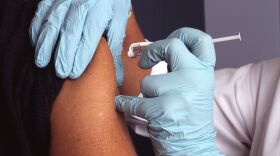If COVID-19 vaccine supplies ramp up as promised in the next few months, half of all adults in Michigan could be fully vaccinated by the end of May, the state epidemiologist said this week.
Currently, more than 1.6 million administered doses have been reported to the Michigan Department of Health and Human Services, with 13.7% of eligible residents having received at least their first dose. That’s up from 11.6% last week, state epidemiologist Sarah Lyon-Callo said at a press conference earlier this week.
But getting to 50% by the end of May would require a major ramp up from where we are now, with about 250,000 doses on average coming to the state each week, to 750,000 per week. And it would need to happen soon.
“You can see the difference in the amount of vaccine that’s projected to come in, versus what we have been receiving,” Lyon-Callo said, pointing to projections developed by experts at the University of Michigan School of Public Health.

“Even with this projected 600 million doses [the Biden administration has reportedlypledgedwill come from Pfizer and Moderna by Juneor July,] we’re expecting that we would reach 50% of Michigan’s eligible population having two doses sort of [at the] end of May, mid-May.”
That’s a “best case scenario,” says Marisa Eisenberg, an associate professor of Epidemiology, Complex Systems, and Mathematics at the University of Michigan, and a member of the team that made these projections.
And it can seem overly optimistic at a time when vaccinations are increasing, but the supply is still relatively scarce. Thousands of eligible residents are on waitlists, and some health systems have had to cancel or stop making first dose appointments altogether after receiving fewer doses than expected the last couple of weeks.
So while the projections are meant to be “illustrative” and the “actual timeline will probably vary from this,” Lyon-Callo said, they do offer Michiganders a way to start thinking about the months to come.
“We’re just trying to find ways to get across how much vaccine we have available currently, and where we hope to be,” Lyon-Callo said. “But our expectation is our vaccine supply will increase, hopefully in March.”
The projections don’t include any additional doses that may come from Johnson and Johnson, which has submitted a single-dose COVID vaccine for FDA consideration later this month, or AstraZeneca’s troubled vaccine.
The team at the University of Michigan made those projections based on a number of assumptions: first, that Pfizer and Moderna both come through with 300 million doses each by the end of July, says Marisa Eisenberg, an associate professor of Epidemiology, Complex Systems, and Mathematics. Secondly, that Michigan will receive a share of those doses based on its population size.
And third, that Dr. Anthony Fauci, President Biden’s chief medical advisor for COVID-19, is correct when he says we’ll have “open season” on vaccines sometime in April.
“So thinking about if we were going to get to that by April, we would need to be receiving some of that larger vaccine supply by March,” Eisenberg said.
Finally, the projections assume Michigan’s projected share of those 600 million doses would be allocated evenly across each week between March and July, and - this is a big one - that the state’s patchwork distribution system of hospitals, health departments, pharmacies and providers is able to get all those shots swiftly into arms.
In reality, Eisenberg says, there will likely be a more gradual ramp up of vaccine supply over the coming months, as opposed to a switch suddenly being flipped that goes from 250,000 average doses a week to 750,000 overnight.
“There are plenty of reasons why timelines can get delayed, and logistical reasons why maybe it's not possible to get that much vaccine out and shipped and administered in that kind of a timeline,” she says. “But it does suggest that vaccine supply, which has certainly been a frustration over the last couple of months, it suggests that we may see some pretty substantial increases in vaccine supply over the next coming months.”







